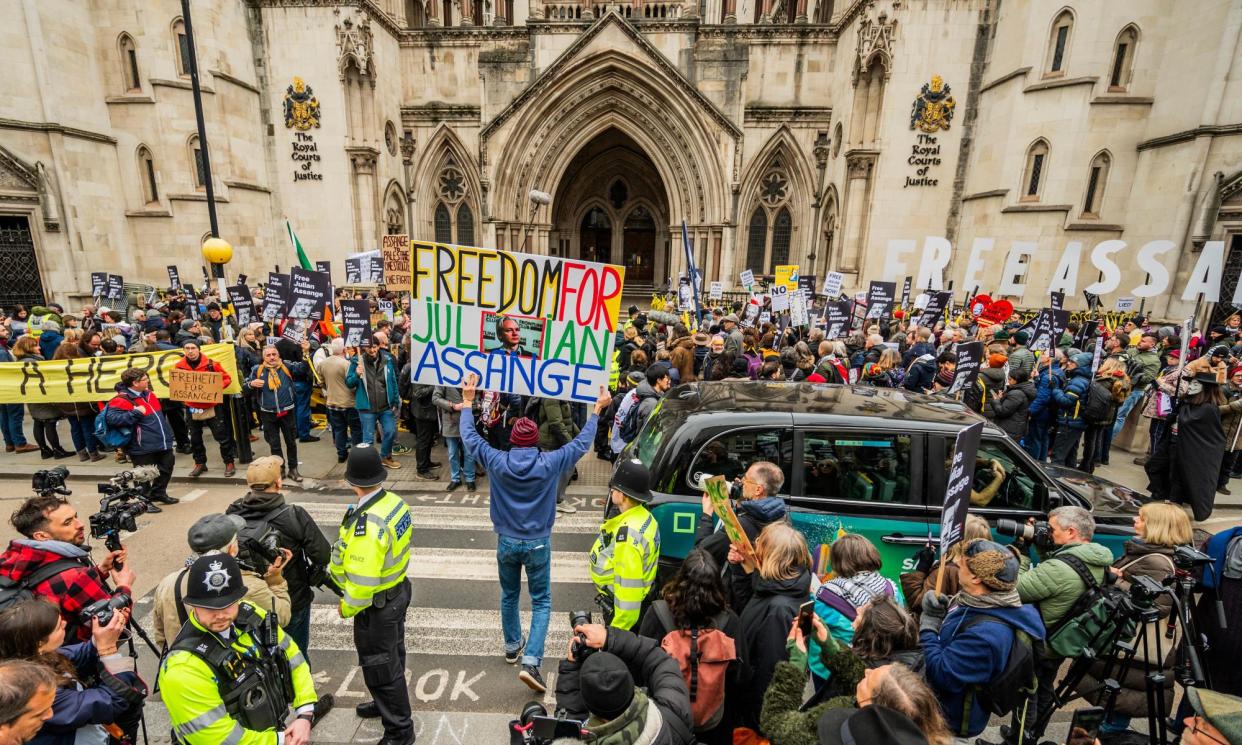‘It’s been a hard journey’: Julian Assange supporters celebrate his release

Beyond Julian Assange’s family, few have been celebrating the past 24 hours more than the dedicated band of supporters that grew out of vigils and protests for him over the past two decades.
“In all the years that I have supported him, I have learned not to be surprised by anything,” said Emmy Butlin, a Greek-born Londoner who was a linchpin of the unofficial campaign to free Assange that worked in tandem with the broader push to oppose his extradition.
“It’s been a hard journey, at times full of grief, but we have a tremendous sense of achievement. It’s been marvellous to be surrounded by people who share your dreams and your ideas,” she said.
Related: Experts warn Julian Assange plea deal could set dangerous precedent
Butlin – who links her passion for freedom of the press to her own family’s experience under the military junta that ruled Greece from 1967-74 – was one of three people who began holding a vigil in 2012 outside the Ecuadorian embassy. Assange had sought asylum inside the building to avoid extradition to Sweden on a rape allegation that he denied, and which he claimed was a ploy to hand him over to the US.
In 2016, those involved in the vigil decided to create a mailing list and form what ultimately became the Committee to Defend Julian Assange. People have come and gone as its core of three grew to six, although Butlin was at pains to emphasise that they saw themselves as part of a worldwide community.
While hundreds have gathered in recent years at events and protests, including outside the high court, Butlin and others have been a constant presence in the face of all sorts of weather, a pandemic and, at times, indifference. That said, she insisted there had always been a disparity between the media coverage of Assange and views of him among the general public.
The Assange supporters’ presence has turned the streets outside various London courts into an often colourful and noisy affair with flags, drums and PA systems, sometimes with a particularly strong Latin American feel.
As well as intending to raise public consciousness, roles have included standing in line for advocates and professional campaigners facing hours of waits to get into Assange appearances.
At other times they have turned up at events that often went below the radar of national media coverage, such as tribunal hearings aimed at squeezing information out of the UK authorities.
“They are the unsung heroes of this story,” said Stefania Maurizi, an Italian journalist who has waged a battle for years to elicit details about the Assange case from the UK and US under freedom of information laws. “They are the winter soldiers who have always been there, without recognition.”
The protests have also attracted extreme views about Assange. His wife, Stella, and lawyers have had conspiracy theories spread about them, claiming that they do not have Assange’s best interests at heart.
Even now, supporters of Assange concede that some on the margins have greeted news of the plea deal with disappointment. “There are some extreme people who want martyrs but you have to remember he is a human being. He has given enough of his life, his body, even, for the cause of press freedom and he has a family who want to see him again,” Maurizi said.
As Assange and his family prepare for a new life, Butlin and others in the UK are not yet ready to – metaphorically – put down their placards.
“Our journey is continuing and we’re still talking to our friends and fellow activists about our next action,” said Butlin, although they are permitting themselves a moment of celebration and are hoping to organise an event for that reason on 6 July in London.
For now, however, her thoughts are with Assange, who she last met – at his invitation – inside the Ecuadorian embassy. “He’s walking free. He’s breathing the air. He’s looking at the sky. He will live well and he will live with the respect of everyone who shares in his dream for a better world,” she said.

 Yahoo News
Yahoo News 
